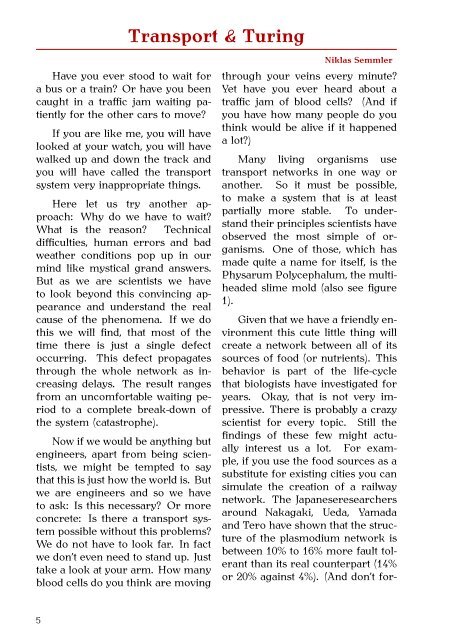Docent vertelt: Taalonderzoek binnen en buiten de gebaande paden
Docent vertelt: Taalonderzoek binnen en buiten de gebaande paden
Docent vertelt: Taalonderzoek binnen en buiten de gebaande paden
Create successful ePaper yourself
Turn your PDF publications into a flip-book with our unique Google optimized e-Paper software.
Have you ever stood to wait for<br />
a bus or a train? Or have you be<strong>en</strong><br />
caught in a traffic jam waiting pati<strong>en</strong>tly<br />
for the other cars to move?<br />
If you are like me, you will have<br />
looked at your watch, you will have<br />
walked up and down the track and<br />
you will have called the transport<br />
system very inappropriate things.<br />
Here let us try another approach:<br />
Why do we have to wait?<br />
What is the reason? Technical<br />
difficulties, human errors and bad<br />
weather conditions pop up in our<br />
mind like mystical grand answers.<br />
But as we are sci<strong>en</strong>tists we have<br />
to look beyond this convincing appearance<br />
and un<strong>de</strong>rstand the real<br />
cause of the ph<strong>en</strong>om<strong>en</strong>a. If we do<br />
this we will find, that most of the<br />
time there is just a single <strong>de</strong>fect<br />
occurring. This <strong>de</strong>fect propagates<br />
through the whole network as increasing<br />
<strong>de</strong>lays. The result ranges<br />
from an uncomfortable waiting period<br />
to a complete break-down of<br />
the system (catastrophe).<br />
Now if we would be anything but<br />
<strong>en</strong>gineers, apart from being sci<strong>en</strong>tists,<br />
we might be tempted to say<br />
that this is just how the world is. But<br />
we are <strong>en</strong>gineers and so we have<br />
to ask: Is this necessary? Or more<br />
concrete: Is there a transport system<br />
possible without this problems?<br />
We do not have to look far. In fact<br />
we don’t ev<strong>en</strong> need to stand up. Just<br />
take a look at your arm. How many<br />
blood cells do you think are moving<br />
5<br />
Transport & Turing<br />
Niklas Semmler<br />
through your veins every minute?<br />
Yet have you ever heard about a<br />
traffic jam of blood cells? (And if<br />
you have how many people do you<br />
think would be alive if it happ<strong>en</strong>ed<br />
a lot?)<br />
Many living organisms use<br />
transport networks in one way or<br />
another. So it must be possible,<br />
to make a system that is at least<br />
partially more stable. To un<strong>de</strong>rstand<br />
their principles sci<strong>en</strong>tists have<br />
observed the most simple of organisms.<br />
One of those, which has<br />
ma<strong>de</strong> quite a name for itself, is the<br />
Physarum Polycephalum, the multihea<strong>de</strong>d<br />
slime mold (also see figure<br />
1).<br />
Giv<strong>en</strong> that we have a fri<strong>en</strong>dly <strong>en</strong>vironm<strong>en</strong>t<br />
this cute little thing will<br />
create a network betwe<strong>en</strong> all of its<br />
sources of food (or nutri<strong>en</strong>ts). This<br />
behavior is part of the life-cycle<br />
that biologists have investigated for<br />
years. Okay, that is not very impressive.<br />
There is probably a crazy<br />
sci<strong>en</strong>tist for every topic. Still the<br />
findings of these few might actually<br />
interest us a lot. For example,<br />
if you use the food sources as a<br />
substitute for existing cities you can<br />
simulate the creation of a railway<br />
network. The Japaneseresearchers<br />
around Nakagaki, Ueda, Yamada<br />
and Tero have shown that the structure<br />
of the plasmodium network is<br />
betwe<strong>en</strong> 10% to 16% more fault tolerant<br />
than its real counterpart (14%<br />
or 20% against 4%). (And don’t for-


